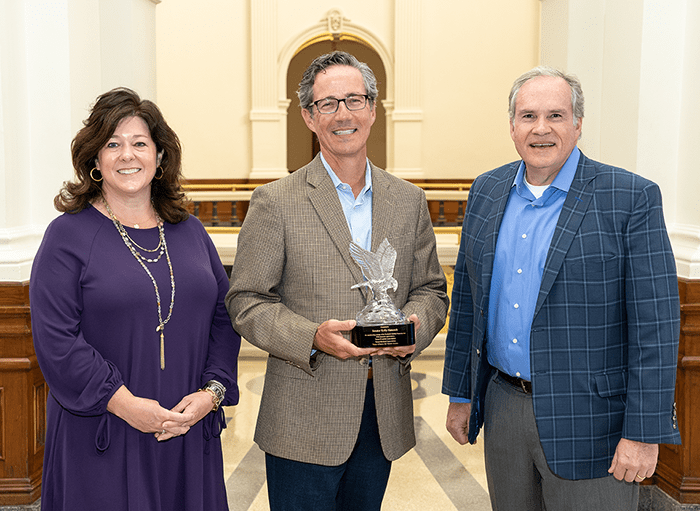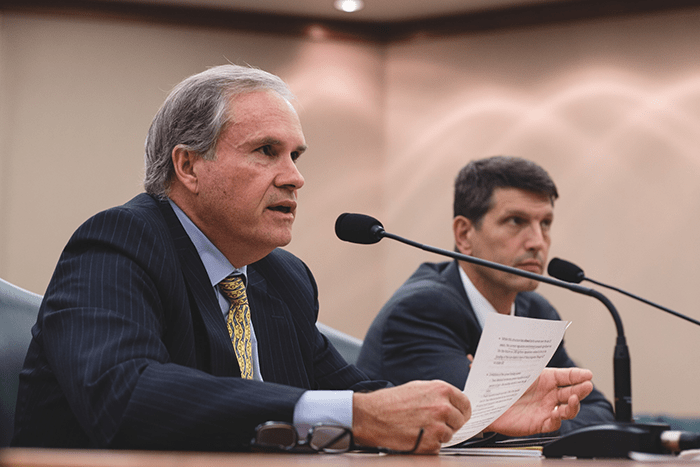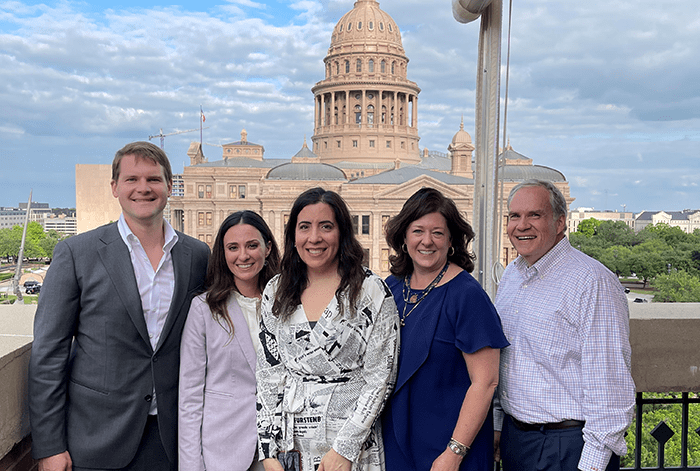On Jan. 1, 2022, longtime hospital lobbyist and public policy advocate, John Hawkins, began his tenure as the sixth CEO of the Texas Hospital Association. Hawkins brings over 35 years of experience in health care legislation and public policy, 17 of which were spent building up THA’s Advocacy and Public Policy program. In those 17 years, John positioned THA as an advocacy leader at the state and federal levels by championing legislation that provided funding and stability for Texas hospitals.
Hawkins has already faced considerable challenges within his first 30 days at the helm. In January 2022, the number of COVID-19 hospitalizations in Texas soared, infecting many health care workers who were unable to provide desperately needed staffing. As a result, John and the THA board made the difficult decision to postpone THA’s 2022 Annual Conference & Expo to ensure health care leaders could focus on the health of their workforce and communities.
Texas Hospitals sat down with the newly minted president and CEO to discuss his prolific background in health care advocacy and his priorities for the future.
Describe your experience in public policy.
My dad was a community college president, and he was very active in his community college association. He was originally a government professor, so he is the one who got me interested in government and civics. My first real exposure to the legislature was back in 1985 when I interned with my state representative from Tyler at the Texas Capitol during my sophomore year at the University of Texas. I worked with him throughout my tenure at UT and I had the opportunity to work on the joint select committee on workers’ compensation. That experience exposed me to the committee and policy process because our charge was to review the workers’ compensation system and make recommendations to reform it. I got to do on-the-ground research, meet with state agencies, do analytical work and help write reports. I then worked with the Department of Information Resources, which was a newly created agency, as a liaison between the agency and the legislature. That position gave me an appreciation for dealing with state regulatory bodies.

When did you become focused on health care policy?
When I went to the Sunset Commission, their responsibility is to review state agency performance and then recommend to the legislature whether to continue the function, let it expire or to modify it. One of the larger reviews I managed was of all the independent Health and Human Services agencies, and we made the first recommendation that lead to the path to creating the umbrella of the Health and Human Services Commission, which is what we have now. That gave me my first exposure to state health and human services system and the Medicaid program. When the opportunity to come to THA presented itself, I was interested because hospitals are at the center of the health care policy debate. Health care is also in my family. My wife has a master’s degree in Healthcare Administration from Trinity University and her dad is a retired physician, so I felt this would be a good fit. And I’ve been here for 17 years, which is the longest I’ve ever been in one job.
How has THA’s Advocacy and Public Policy team grown over the past 17 years?
We emphasize evidence-based advocacy, always trying to use member-specific data on issues that we are advocating about. In addition, we’ve prioritized building relationships with the government relations staff at our member hospitals by making sure we’re getting them the tools they need to advocate effectively and ensuring we’re delivering a unified message. Because of that effort, our level of member engagement has grown a lot.

The Advocacy and Public Policy team has grown significantly too. We’ve built a specialization in behavioral health issues and have a very active Behavioral Health Council. We are more involved in Washington and have maintained a strong relationship with the American Hospital Association and stay active on federal issues that impact our members. Additionally, we’ve worked very hard to structure our Council on Policy Development to ensure it represents the diversity of our membership to include rural hospitals, urban hospitals and have participation from all aspects of hospital operations represented.
HOSPAC is a key piece too. We’ve worked hard to make sure that our endorsement is meaningful and not just proforma. Our HOSPAC board takes the time to vet all candidates to ensure we’re supporting candidates who are interested in health care and supporting hospitals.
What are some of the biggest legislative wins that THA has helped secure for Texas hospitals?
I think we’ve secured a lot of wins both proactively and defensively. Proactively, the most important wins have certainly been related to funding. We’ve been able to get significant additional state funding into the Medicaid program through targeted rate increases.
We protected the trauma funding for our hospitals by replacing the controversial funding mechanism that was originally created for trauma funding. We’ve been able to protect our supplemental Medicaid payments through our waiver, which has been and continues to be very difficult. Through the Nursing Shortage Reduction Program, we increased salaries for nursing faculty, which helps with training nurses, and we’ve increased funding for graduate medical education, which helps train physicians.
Defensively, we’ve protected our medical liability reforms and we’ve also generally maintained our Advanced Directives law, which is the model for dealing with end-of-life issues.
What do you anticipate will be the biggest challenges facing Texas hospitals in 2022?
Obviously, the number one factor is COVID-19. I think we’ve done a good job accessing funding and staffing support to help offset some of the challenges of COVID-19. Most important now is adressing the workforce challenge that’s been created because of COVID-19. Despite some of those wins on the workforce side, we never fully worked our way out of the workforce shortage, particularly in nursing. The pandemic has increased attrition in our hospitals’ workforce. The short-term challenge is to meet our members’ needs right now. The long-term challenge is building up workforce training infrastructure and pipeline. And of course, as the state with the highest number of uninsured residents, progress towards health care coverage expansion in Texas will always be a top priority for THA.

What excites you the most about leading THA and its members in this new role?
I enjoy testifying before the legislature; I enjoy public speaking and interacting with other stakeholders and community groups. This position allows me to be in front of all these key health care issues publicly. I think it’s important that we’re thought leaders on difficult topics like vaccines and public health infrastructure, proactively seizing the narrative, whether with the press, legislators, regulators or other community groups and associations. Public health affects the business environment, and we need to illustrate that these issues impact everyone, not just those in the hospital industry. Now, it’s my job to connect the dots.
